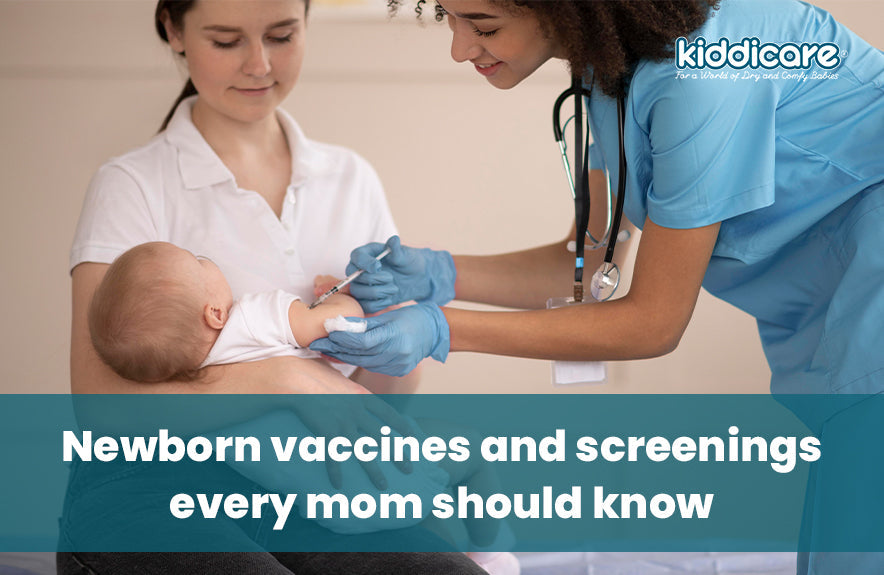
Newborn Vaccines and Screenings Every Mom Should Know
Bringing a newborn into the world is a joyous and transformative experience, but it also comes with immense responsibility. Among the many concerns new parents have, ensuring their baby's health and protection from preventable diseases is at the top of the list. Vaccinations and screenings play a critical role in safeguarding your newborn's future.
While it can feel overwhelming to keep track of medical schedules, hospital visits, and health checkups, having the proper knowledge can make it easier. This comprehensive manual guides you through the essential newborn vaccines and screenings every mom should be aware of, providing you with evidence-based insights, practical tips, and reassurance.
Why Vaccines and Screenings Are Vital for Newborns
The first days and weeks of a baby's life are crucial. Their immune system is still developing, making them more vulnerable to infections. Vaccinations and screenings serve as the first line of defence, ensuring:
- Early detection of potential health conditions.
- Protection from life-threatening illnesses.
- Stronger immunity against infections.
- Peace of mind for parents.
Research from the World Health Organisation (WHO) and the Centres for Disease Control and Prevention (CDC) confirms that newborn vaccinations and screenings have saved millions of lives worldwide.
Essential Newborn Vaccines Every Parent Should Know
Vaccines are not just shots, they are shields of protection for your baby's future health. Let's examine the core vaccines most newborns receive during their first year of life.
1. Hepatitis B Vaccine
- When given: At birth (within 24 hours), accompanied by follow-up dosages at 1–2 and 6–18 months.
- Why it’s essential: Guards against Hepatitis B, a persistent liver infection that can cause cirrhosis or liver cancer in later life.
- Tip for moms: Ask your hospital if they routinely provide this vaccine right after delivery.
2. BCG (Bacillus Calmette-Guérin) Vaccine
- When given: At birth or soon after.
- Why it’s essential: Protects against severe forms of tuberculosis (TB), which is still prevalent in many countries.
- Note: Not always given in the U.S., but it is a must in Asia, Africa, and many other regions.
3. Polio Vaccine (IPV/OPV)
- When given: Usually starts at 6 weeks of age, but in some regions, an oral dose is given at birth.
- Why it’s essential: Protects against polio, a disabling and life-threatening disease.
4. DTP (Diphtheria, Tetanus, and Pertussis)
- When given: Typically from 6 weeks onward.
- Why it’s essential: Shields your baby from three serious diseases, diphtheria (throat infection), tetanus (muscle stiffness), and pertussis (whooping cough).
5. Hib (Haemophilus influenzae type b) Vaccine
- When given: 6 weeks onward in many immunisation programs.
- Why it’s essential: Prevents meningitis, pneumonia, and serious throat infections in babies.
6. Rotavirus Vaccine
- When given: Oral vaccine at 6 weeks onward.
- Why it’s essential: Protects against severe diarrhoea and dehydration caused by rotavirus.
7. Pneumococcal Conjugate Vaccine (PCV)
- When given: From 6 weeks onward.
- Why it’s essential: Protects against pneumonia, meningitis, and blood infections.
8. MMR (Measles, Mumps, Rubella)
- When given: Around 9–12 months, depending on national guidelines.
- Why it’s essential: Prevents three highly contagious viral diseases.
Expert Tip: Follow your country's national immunisation schedule, but always consult your paediatrician for region-specific adjustments.
Newborn Screenings Every Mom Should Know
Screenings are equally crucial as vaccines because they identify hidden health issues early, even before symptoms appear.
1. Newborn Blood Spot Test (Heel Prick Test)
- When done: Usually within the first 48–72 hours.
- What it checks: Rare but serious genetic, metabolic, and hormonal disorders like congenital hypothyroidism, sickle cell disease, and phenylketonuria (PKU).
- Why it’s essential: Early detection ensures timely treatment, preventing complications.
2. Hearing Test
- When done: Before hospital discharge or within the first month after discharge.
- Why it’s essential: Detects hearing loss early, allowing interventions that support language development.
3. Critical Congenital Heart Disease (CCHD) Screening
- When done: Within 24–48 hours using pulse oximetry (a simple oxygen check).
- Why it’s essential: Identifies severe heart defects that may need surgery or medical care.
4. Jaundice Screening
- When done: During hospital stay and follow-up visits.
- Why it’s essential: Severe jaundice can harm the brain if untreated. Early checks ensure safe management.
5. Hip Dysplasia Screening
- When done: Physical examination in the hospital and during pediatric visits.
- Why it’s essential: Detects abnormal hip development early to prevent mobility problems.
6. Vision and Eye Health Check
- When done: First pediatric checkups.
- Why it’s essential: Detects cataracts, retinoblastoma, or other early vision problems.
How Parents Can Stay on Track with Vaccines & Screenings
Managing appointments, follow-ups, and tests can be a stressful task. Here are practical ways to make it easier:
- Keep a Vaccination Record Card: Most hospitals provide one, so be sure to keep it safe.
- Set Calendar Reminders: Use phone apps to track vaccination due dates.
- Schedule Pediatric Visits Early: Don't wait for symptoms preventive care is key.
- Ask Questions: If you're unsure about a vaccine or screening, consult your pediatrician.
- Stay Updated: Follow the guidelines of your country's health ministry or the CDC/WHO.
Myths vs. Facts About Newborn Vaccinations
-
Myth: Too many vaccines overwhelm a baby's immune system.
Fact: Babies are exposed to more germs daily than they receive in vaccines their bodies can handle it. -
Myth: Natural immunity is superior to vaccine-induced immunity.
Fact: Diseases like measles or pertussis can cause lifelong complications vaccines provide safe immunity. -
Myth: Vaccines cause autism.
Fact: Extensive studies confirm there is no link between vaccines and autism.
Role of Moms in Ensuring Baby's Health
Mothers are often the first advocates for their baby's health. By staying informed, asking questions, and ensuring timely vaccinations and screenings, moms play an irreplaceable role in building their child's strong foundation for life.
Looking for everyday essentials? Choose Kiddicare Nappies & Wipes for gentle, worry-free care. Our nappies are designed for a comfy, leak-secure fit through day and night, and our 99% pure-water, plant-based wipes are dermatologically tested for newborn-soft skin. Keep your hospital bag (and diaper bag) stocked. Kiddicare has you covered from the very first cuddle.
Summary
Newborn vaccines and screenings are not just medical formalities, they are life-saving tools. From the Hepatitis B vaccine at birth to essential screening tests like hearing checks and the heel prick test, each step is crucial in protecting your baby's future.
By following the recommended immunisation schedules and ensuring timely screenings, you give your baby the best possible start. Remember, prevention is always better than cure, and being proactive about your newborn's health can make a lifelong difference.




